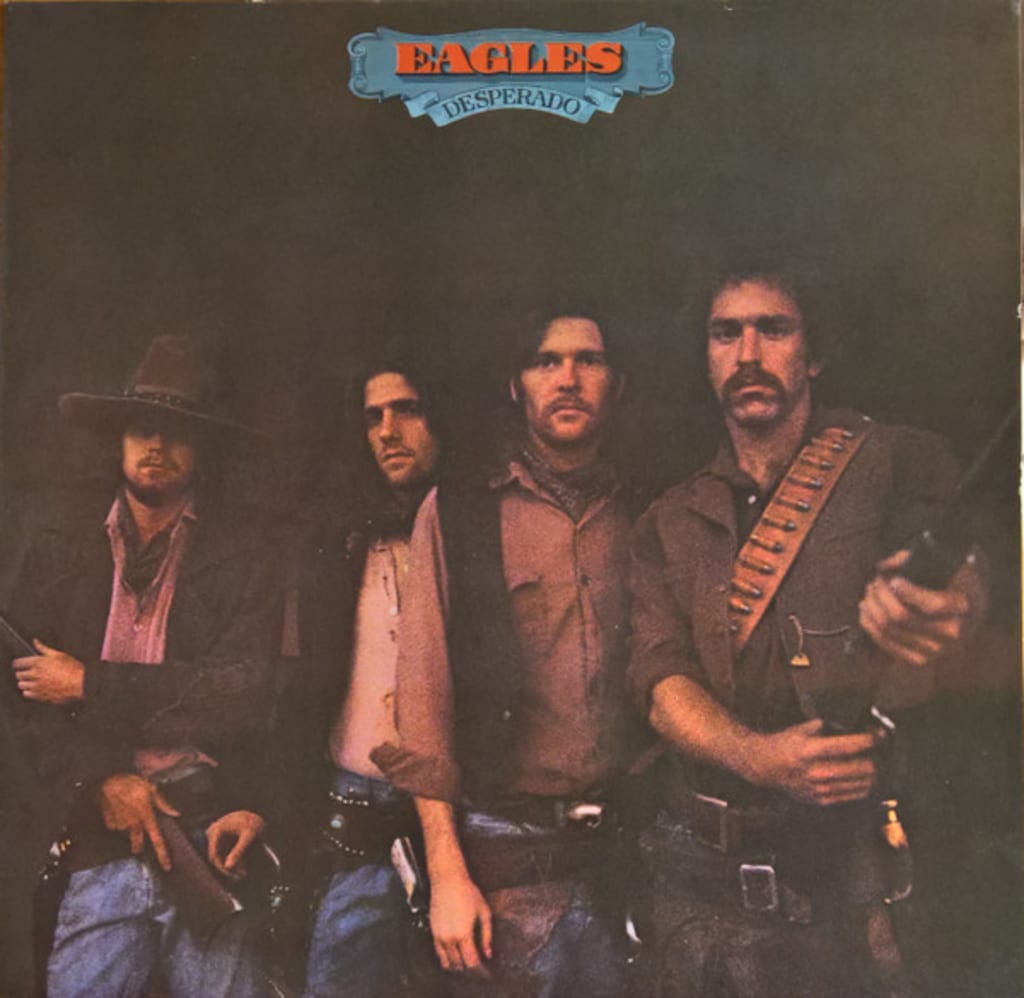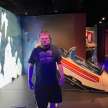'Desperado'
The Eagles' Western-themed second album

In 1972, the album Eagles proved highly successful, making the band one of the most successful purveyors of country rock even so early in their career. Now, in 1973, they faced the daunting task of following up that hit record, with the album Desperado coming out in April.
In a way, the initial idea for the Desperado album originated well before the band even existed. In 1969 Eagles' friend and collaborator Jackson Browne was 21, and was given a book about western gun fighters by Ned Doheny. He brought it to the band's attention and as they pored over the stories of the famous outlaws of the old west they saw parallels between the life of an outlaw in the 1870s and a rock musician in the 1970s. This being an age where concept albums were all the rage, Eagles pitched the idea of a western themed album to Asylum Records head David Geffen, who trusting both Browne and Eagles (his most successful acts at the time) gave the album the green light.
Once again production duties went to Glyn Johns at Geffen's behest, and the design of the album cover went to Gary Burden and Henry Diltz, who staged a photo-shoot with the four Eagles, Browne and J.D. Souther at the western set at Paramount Ranch in Malibu Canyon, in which they wore authentic western costumes and had a mock gun fight. The album was recorded at Island Studios in London at Notting Hill Gate.
The album opens with the acoustic guitar and harmonica-laden "Doolin-Dalton" named after the famous outlaw gang of train robbers in the Oklahoma territory in the 1890s. The song was written by Glenn Frey and Don Henley with Browne and Souther at the Troubadour club in Los Angeles.
"Twenty-One" is a banjo-driven song by Bernie Leadon who also sings lead on the song. The song is named for the age at which Emmit Dalton, the youngest of the Doolin-Dalton gang was at the time he was shot 23 times during a raid in Kansas. Amazingly, he survived.
An electric guitar solo leads into the hard rocking "Out Of Control" written by Henley and Frey with Tom Nixon. The song gives the band an opportunity to let loose, reflecting the abandon with which Frey would want to do more often.
The more serene musical and vocal template that made the first album a hit reemerges soon enough. A jangling acoustic guitar introduces "Tequila Sunrise," which was the first song written and attributed to the soon to be ubiquitous Henley/Frey songwriting team. A beautiful song, in the vein of "Peaceful Easy Feeling" from the first LP, it is now considered an Eagles classic. Somehow, though, it failed to crack the Top 50 as the album's first single.
Next up is another classic, the title track. "Desperado" begins with fine piano work from Frey, with Henley singing lead on his own lyrics, some of which date back to his Shiloh days. The song benefits greatly from an epic string arrangement from Jim Ed Norman. The song was never released as an Eagles single; in fact, Henley credits Linda Ronstadt's performance of the song on her album Don't Cry Now, with first popularizing the song.
"Side 2" of the LP kicks off with "Certain Kind of Fool," bassist Randy Meisner's songwriting (with help from Henley and Frey) and vocal contribution to the album. The song describes how a poor boy can evolve into an outlaw.
A banjo and guitar instrumental version of "Doolin-Dalton" provides a segue to the album's second single, into "Outlaw Man." The song was written by David Blue. Blue was an Asylum artist who released the song that same year on his album Nice Baby and the Angel (worth checking out if you can find it, for its title track more than four his less harmonic version of "Outlaw Man"). Glenn Frey sings lead, plays acoustic guitar, Jim Ed Norman plays piano and a Wurlitzer electric piano on the track. It's a nifty track that fits the theme, but it's less surprising that this single also failed to hit the Top 50.
What follows "Outlaw Man" is the second set of consecutive ballads, and these to me are two of the most underrated songs in the Eagles' catalog. "Saturday Night," written by all four Eagles, is an acoustic guitar and mandolin driven ballad. Don Henley shines as lead vocalist, giving the wistful lyric a highly sentimental feel.
Bernie Leadon wrote and sings "Bitter Creek," another wistful tune about a desperado hitting the road for one last robbery that will show his detractors he has "won the race." The song slowly and effectively bubbles along, with some fine harmonies and guitar work taking us along for a rewarding ride.
This being a concept album, the band decided to close proceedings with a medley reprising what were probably the album's two most notable tracks (with apologies to "Tequila Sunrise.") This was not a completely new idea, certainly--for example, the Beatles reprised the title track from their Sgt. Pepper album before the closing "Day in the Life." And on Desperado, the conceit is very well executed and provocative. The track begins with a reprise of "Doolin-Dalton" that concludes the song in style, with Henley again shining on the vocal. A high, lonesome banjo solo by Leadon, leads into a reprise of "Desperado" with no significant new lyrics, but great vocal harmonies that bring the album to a fine close.
Because Desperado was far less successful commercially than the Eagles album, the band considered it a disappointment, a point of view that greatly affected how they went about business on their next album. But it's hard to agree with them from a quality standpoint. The album is now considered a classic and holds up very well in their catalog. And when the first Eagles Greatest Hits album began its remarkable chart run (gaining the distinction of best-selling album of the 20th Century), "Tequila Sunrise" and "Desperado" found their place as stone cold classics, holding up to anything from the first album and anything that followed. These were also the first successes for the Frey-Henley songwriting team, who would continue to take the band into the stratosphere for the rest of the '70s and eventually beyond.
About the Creator
Sean Callaghan
Neurodivergent, Writer, Drummer, Singer, Percussionist, Star Wars and Disney Devotee.






Comments
There are no comments for this story
Be the first to respond and start the conversation.